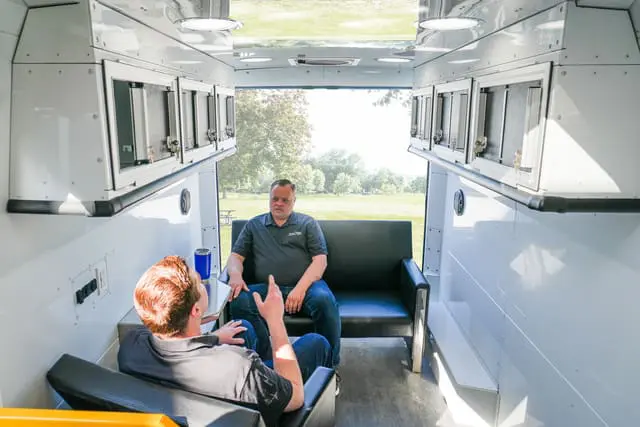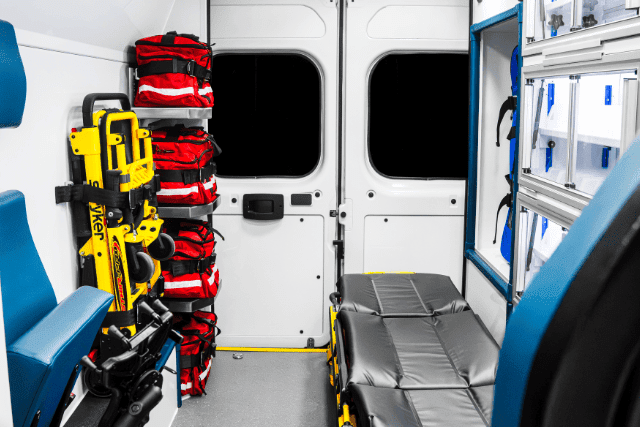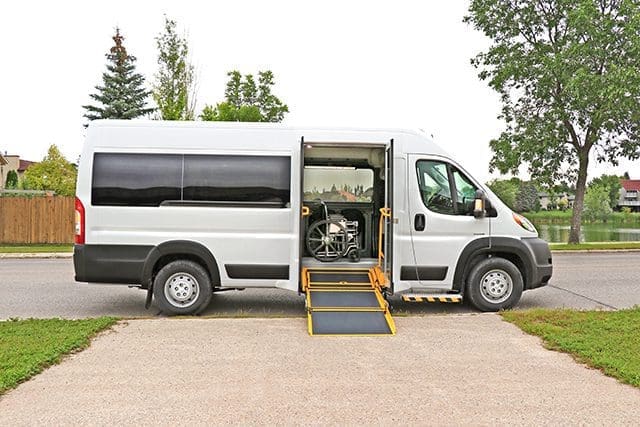Did you know that one in two Canadians currently has or will have a mental illness by the time they reach 40 years of age? It’s a shocking statistic, right? If you’re part of an organization trying to support people struggling with mental health issues, you might feel overwhelmed and unsure where to start. Trust us, you’re not alone. One effective approach is known as preventive counselling.
At MoveMobility, we’ve been manufacturing wheelchair-accessible and mobile medical vans for over 20 years. We design and build these vehicles so organizations like yours can use them to break down barriers to healthcare and transportation, resulting in saved lives and equal accessibility for everyone.
We know how tough it can be to offer accessible and effective mental health support to people struggling in Canada. We’re all about helping organizations build a stigma-free society where mental health care is available to everyone, everywhere.
In this article, we’re going to cover:
- What preventive counselling is
- The benefits of preventive counselling
- How preventive counselling works
We want to share some of the knowledge we’ve gained from manufacturing hundreds of mobile medical units for customers over the years. We hope it will help you make smarter decisions about adding preventive counselling to your organization’s support system services. We’ll break it down in a way that’s easy to understand, and by the time you’re finished reading, you’ll know if offering preventive counselling services is the right approach.
What is preventive counselling?
Preventive counselling is all about stopping mental health problems before they start. Instead of waiting for issues to get serious, this approach focuses on catching them early. It helps people build coping skills, resilience, and healthier ways of thinking and behaving.
Think of it like this: In a First Nations community in Canada, there might be more mental health challenges because of social and economic factors. Preventive counselling here could mean regular counselling sessions where people can talk about their feelings and concerns.
For example, imagine a young person named Lyle who lives in this community. Lyle might go to a counselling session to learn how to deal with stress and make better friends. After a few sessions, his stress is regulated, and he has a new social circle that won’t cause him any trouble.
What are the benefits of preventive counselling?
Preventive counselling has many benefits that can make a big difference in people’s lives. Here are some of the key benefits:
1. Early detection of issues
Spotting problems early: Regular talks with a counsellor help catch mental health issues before they become serious.
Less severe symptoms: Early intervention means symptoms can be managed better and won’t get out of control.
2. Building stronger coping skills
Learning to handle stress: People learn ways to manage stress and anxiety.
Better problem-solving: Counselling helps develop skills to handle life’s challenges more effectively.
3. Creating a support system
Having someone to talk to: Regular sessions with a counsellor provide a safe space to share feelings.
Feeling less alone: Knowing there’s support can make people feel more connected and less isolated.
4. Improving overall well-being
Improved mental health: People who get preventive counselling often feel better overall.
Healthier relationships: Learning how to communicate and manage emotions can lead to stronger, healthier relationships with others.
5. Reducing stigma
Normalizing mental health care: Regular counselling can help reduce the stigma around mental health, making it easier for others to seek help.
Creating a stigma-free society: When more people use preventive counselling, it encourages a more accepting attitude toward mental health.
An example of preventive counselling in action
Let’s take a look at another example of preventive counselling and how it can help.
Kara, a 16-year-old high school student, struggled with anxiety and depression. She felt overwhelmed by school pressures and social expectations, which led to thoughts of suicide. Her school noticed the signs early and recommended preventive counselling.
How did preventive counselling help?
- The school counsellor recognized her symptoms and intervened before her thoughts worsened.
- Kara learned techniques like deep breathing and journaling to manage stress and anxiety.
- Regular sessions provided a safe space for Kara to express her feelings, making her feel less alone.
- Kara’s mental health improved, and she built stronger relationships with friends and family.
- Kara became an advocate for mental health, encouraging others to seek support.
Preventive counselling turned Kara’s life around, showing its power in promoting mental health and creating a stigma-free society.
How does mobile preventive counselling work?
Preventive counselling usually means going to a therapist or psychologist at a specific location. You talk with a professional about your feelings, learn coping strategies, and get support before things get out of control.
But what if you can’t get to a therapist because of transportation, money, mobility, or other problems? For many people in remote areas of Canada, driving to an office for counselling just isn’t possible.
So, how do you fix this? You bring the counselling to them! One of the best ways to do this is with a vehicle set up for counselling services. If your organization is new to this type of service, it can be done in several different vehicle options:
- Converted buses: Large buses converted into counselling spaces with multiple private areas.
- Vans: Smaller, more flexible options that can navigate tight spaces and rural roads.
- Trailers: Towable units that can be set up as temporary counselling centers.
- RVs: Recreational vehicles modified to include private counselling spaces.
At MoveMobility, we specifically manufacture vans that organizations like yours can use to break barriers to healthcare and save lives. Keep reading to learn about the Mobile Counselling Van.
What is the Mobile Counselling Van?

The Mobile Counselling Van is designed specifically for mental health support and counselling. Some of the benefits of these vehicles include:
Living room layout: The Mobile Counselling Van feels like a living room in your home. It has a comfortable sofa, chair, and side table.
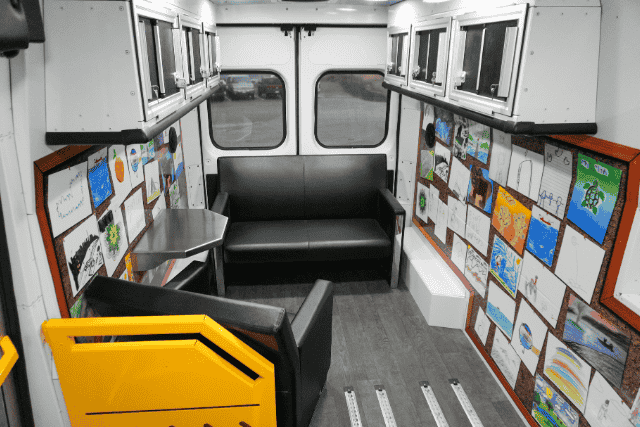
Plenty of natural light: The van has an interior skylight and a large rear window that lets in a stunning amount of light.
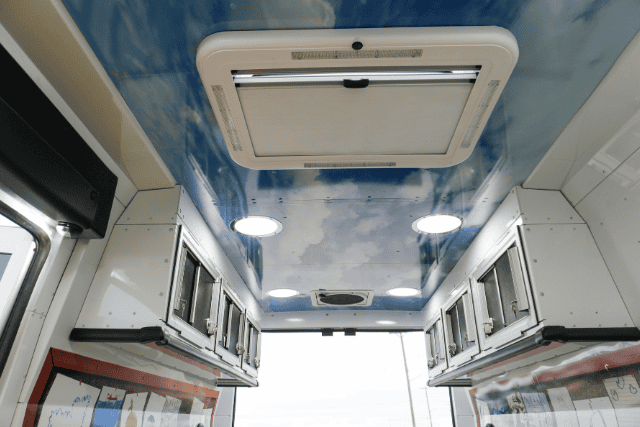
Ability to travel to remote areas: You can reach people who can’t get to a therapist.

Set up temporary counselling centers: Provide private, confidential, and secluded spaces for preventive counselling sessions.
Ramp for accessibility: The side-entry ramp makes it easier for people with mobility issues to enter the van.
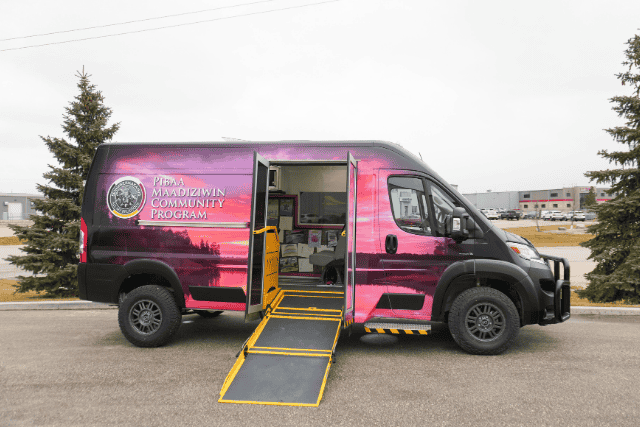
Offer flexible scheduling: Allow people to get the help they need at times that work for them.
Easy access: Therapists can visit different communities and offer regular sessions.
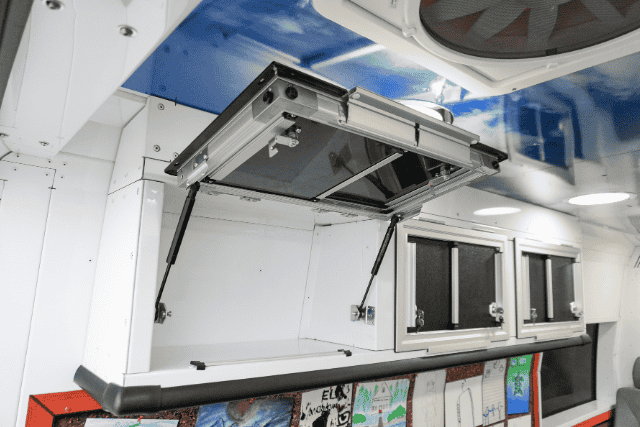
Building trust: Regular visits help build trust within the community.
Saves money: Cuts down on the need for long trips to get mental health care.
Less stigma: People visiting mobile counselling units don’t have to deal with the stigma of going to a busy office.
Bringing preventive counselling to people through mobile units ensures that everyone can get the mental health care they need, no matter where they live or their financial situation. This solution helps create a more supportive and inclusive society.
Understanding preventive counselling and the next steps
You came to this article to learn how your organization can help people with mental health issues through preventive counselling. Now, you know what preventive counselling is, its benefits, and how mobile counselling units can help.
At MoveMobility, our mobile units provide private and safe spaces for preventive counselling. They reach people in remote areas and help reduce the stigma of mental health care. We are dedicated to creating a stigma-free society where everyone can get the mental health support they need.
We believe in using new ideas to remove barriers and save lives. If you have questions about preventive counselling and our vehicles, click the button below to talk to a mobility expert. We are here to help you make a real difference in your community, and we care about your organization making the right decision, even if it means not choosing us to partner with.
If you don’t think you’re ready to talk to a mobility expert yet, we have two other comparison articles you can check out to learn more. The first article compares mobile medical vans to RVs, and the second compares mobile medical vans to buses. This will give you a better idea of which type of vehicle is more suitable for your preventive counselling services.


